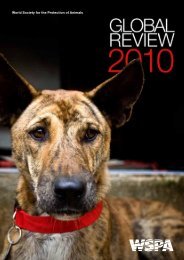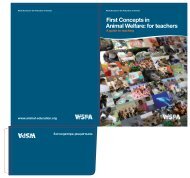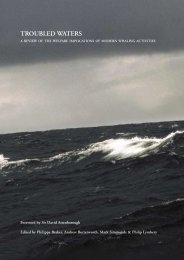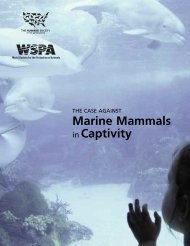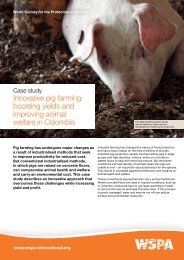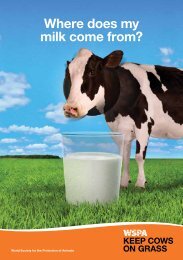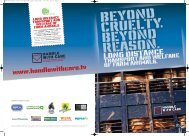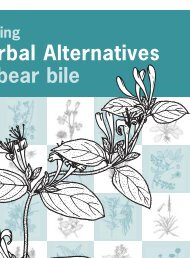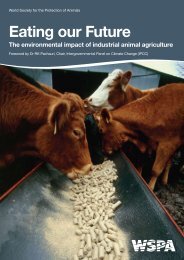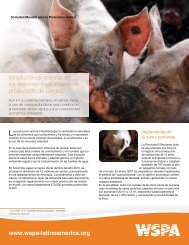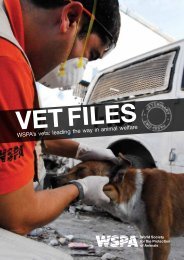Annex 4Submitted abstracts accompanyingposter presentationsare harassed. The support <strong>of</strong> children is essential, <strong>the</strong>yencourage people to collaborate in ga<strong>the</strong>ring trashalong <strong>the</strong> beach. Last summer, <strong>the</strong> presence <strong>of</strong> Clown“Gingko Biloba” was key to reaching more children andadults, making <strong>the</strong> cleaning amusing, more fun andsymbolic. Among <strong>the</strong> challenges faced are reaching asmany beaches as possible; cleaning all <strong>the</strong> area andpromoting awareness, including beach hostels in <strong>the</strong>campaign with <strong>the</strong>ir customers and <strong>the</strong>ir own waste.Also recruiting more volunteers who have previouslybeen trained. The enormous impact that waste hason <strong>the</strong> coast and later on marine animals has beenshown by a sample collected on one <strong>of</strong> <strong>the</strong> beachesby 6 volunteers during 3 hours; what predominatedwere: plastic bags, fishing nets, and also cigarette ends(totalling 3.284), micro waste like popsicle sticks, bottlecaps and straws, bottles, plastic cups, string, wireand plastic coated paper,. We collected about 70kg <strong>of</strong>garbage in a single morning. The marine animals mainlyaffected are 5 species <strong>of</strong> turtles and some seabirdsbecause <strong>of</strong> plastics. Local stakeholders are: La PalomaCouncil, Local Board <strong>of</strong> Punta del Diablo, Las BoyasHostel, Point G Artisan Gelato, CLEAN UP OCEANCONSERVANCY-ECOPLATADINAMA-MVOTMA*. As forcleanup recommendations: begin <strong>the</strong> campaign ahead,through all means possible; during <strong>the</strong> summer, start in<strong>the</strong> morning or late in <strong>the</strong> day due to <strong>the</strong> sun’s intensity;require participants to bring sunscreen and hat; provideplenty <strong>of</strong> fresh water (one person must be responsible forits distribution); have a protocol for volunteers on wastecollection and materials; enable <strong>the</strong>m to manage <strong>the</strong>payroll and data collection, including group organization(team leader and collectors). As <strong>the</strong> waste counting isreported by <strong>the</strong> collector to <strong>the</strong> person who takes data,it is vital that each data collector scorer is very wellacquainted with <strong>the</strong> form. Coordination with <strong>the</strong> localcouncil is important for <strong>the</strong> removal <strong>of</strong> <strong>the</strong> bags anddisposal. Participation and commitment <strong>of</strong> <strong>the</strong> localauthorities is essential for <strong>the</strong> public policies incidenceon this topic.Marine Debris Management and Recycling Project:Watamu, KenyaSteve TrottWatamu Marine AssociationWatamu, Kenyastevetrott@watamu.bizwww.watamu.bizThe PlaceThe Project area is part <strong>of</strong> Kenya’s first National MarinePark and a UNESCO recognised Biosphere Reserve.The Park and Reserve harbour rich marine habitatsincluding: coral reefs, sea grass meadows, mangroveforest and more than 600 species <strong>of</strong> fish. Five species <strong>of</strong>endangered sea turtle are found in <strong>the</strong> local waters alongwith Indo-Pacific bottlenose dolphins, spinner dolphinsand humpback whales that are resident in <strong>the</strong> area ormigrate through its waters.The ProblemA serious problem related to both solid and s<strong>of</strong>t plasticwaste is <strong>the</strong> threat to marine life. Plastic bags andmaterials are ingested by sea turtles mistaking <strong>the</strong>m forjellyfish which are part <strong>of</strong> <strong>the</strong>ir natural diet. Each yearendangered sea turtles are washed ashore in Watamusuffering from plastic ingestion. Most <strong>of</strong> <strong>the</strong> turtleseventually die due to internal problems and starvationthrough gut blockage. Discarded and lost fishing gearspose a fur<strong>the</strong>r threat through entanglement not just tosea turtles but to dolphins, whales and o<strong>the</strong>r marine life.The SolutionTo tackle <strong>the</strong> problem <strong>of</strong> plastic and o<strong>the</strong>r marinedebris <strong>the</strong> Project was set up in 2009 as a communityenterprise and is substantially reducing <strong>the</strong> amount <strong>of</strong>waste that impacts directly on <strong>the</strong> health and biodiversity<strong>of</strong> <strong>the</strong> marine environment. This is made possible bycarrying out weekly beach clean ups which stops <strong>the</strong>re-entry <strong>of</strong> <strong>the</strong>se waste materials into <strong>the</strong> sea. Thisnot only has measurable conservation results but alsoencourages tourists to visit <strong>the</strong> beaches and <strong>the</strong>rebyboosting <strong>the</strong> local economy. All plastic waste collectedfrom <strong>the</strong> beaches is recycled and sold and <strong>the</strong> incomegenerated helps <strong>the</strong> initiative to remain operational andsustainable. Rubber waste, ropes, fishing nets and o<strong>the</strong>rentanglement materials collected are used by local artiststo create unique marine debris artwork which is marketedin local hotel boutiques.50
Annex 4Submitted abstracts accompanyingposter presentationsPartnershipsThe Watamu Marine Association manages andcoordinates all Project operations and provides in kindsupport for Project activities. Project partners includelocal community women and youth groups and privatehotels and resorts. These partners provide wastecollectors to clean <strong>the</strong> beaches, vehicles for wasteremoval, sponsorship and fundraising support for <strong>the</strong>Project. This support provides part time employment for40 local community members to carry out weekly beachclean ups.Project SuccessThe main key to success <strong>of</strong> <strong>the</strong> Project is <strong>the</strong> cooperationbetween community organisations and <strong>the</strong> localmarine tourism industry in creating a plastic recyclingvalue chain. The results are cleaned-up beaches andemployment opportunities in poor communities. Byturning plastic pollution into pr<strong>of</strong>it creates a win winsituation for marine life, coastal communities and <strong>the</strong>tourism industry.The FutureIn 2011 <strong>the</strong> Project was recognised by UNEP andreceived a SEED Award for entrepreneurship and <strong>the</strong>potential <strong>of</strong> <strong>the</strong> Project to inspire o<strong>the</strong>r communities.By combining environmental welfare and conservationefforts with community empowerment, employmentand alternative income generation, <strong>the</strong> initiative setsan example for successful community based marinedebris management.Fishing For Litter: The voluntary removal <strong>of</strong> marinedebris by <strong>the</strong> fishing fleetTom PiperKommunenes Internasjonale Miljøorganisasjon (KIMO)www.fishingforlitter.orgtom.piper@kimo.shetland.orgFishing for Litter is an environmental project, undertakenby KIMO in Scotland, The Ne<strong>the</strong>rlands, South WestEngland, Isle <strong>of</strong> Man, Sweden and <strong>the</strong> Faeroe Islands,designed to engage <strong>the</strong> fishing industry to reduce<strong>the</strong> amount <strong>of</strong> marine litter in our seas by physicallyremoving it and improve waste management practicesin <strong>the</strong> fishing industry.Fishing for litter is a simple idea, participating vesselsare given hardwearing bags to collect marine litterthat is caught in <strong>the</strong>ir nets as part <strong>of</strong> <strong>the</strong>ir normalfishing activity. Full bags are deposited on <strong>the</strong> quaysidewhere <strong>the</strong> participating harbours move <strong>the</strong> bag to adedicated skip for disposal. The project provides <strong>the</strong>bags and covers <strong>the</strong> waste costs and <strong>the</strong> fishermen andharbours volunteer <strong>the</strong>ir time.There have been two big challenges to <strong>the</strong> project i)securing enough funding on tough economic times. Thecost <strong>of</strong> waste collection and disposal is high and in <strong>the</strong>Europe <strong>the</strong> associated taxes are always increasing todeter <strong>the</strong> generation <strong>of</strong> waste. The project is unfairly hitby <strong>the</strong>se taxes as we do not generate waste we cleanup o<strong>the</strong>r peoples waste. KIMO continues to lobby foran exemption. And ii) In <strong>the</strong> first years <strong>of</strong> <strong>the</strong> projectit took patience to gain <strong>the</strong> endorsement <strong>of</strong> fisheriesorganisations. Harbours always saw <strong>the</strong> benefits <strong>of</strong> <strong>the</strong>project and <strong>the</strong>y helped validate <strong>the</strong> project. A healthy PRbudget at <strong>the</strong> beginning <strong>of</strong> <strong>the</strong> project helped <strong>the</strong> projectestablish as normal practice in <strong>the</strong> industry and now allaspects <strong>of</strong> <strong>the</strong> sector recognise <strong>the</strong> importance <strong>of</strong> <strong>the</strong>project and support its development.While monitoring has always been a secondary aspect <strong>of</strong><strong>the</strong> project it is one <strong>of</strong> <strong>the</strong> few activities that gives an idea<strong>of</strong> <strong>the</strong> types <strong>of</strong> litter that end up on <strong>the</strong> seabed (morethan 50% plastic) and we are currently piloting improveddata collection procedures with some vessels to seeif we can provide information that can be fed intoscientific models.51



